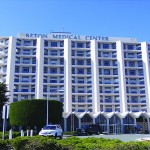South San Francisco, CA October 25, 2015 by Brendan Bartholomew SF Examiner
California Attorney General Kamala Harris will soon decide whether to approve a transaction that would put Wall Street hedge fund BlueMountain Capital Management in charge of Daly City’s Seton Medical Center and its parent organization, the Catholic, nonprofit Daughters of Charity Health System.
In addition to Seton Medical Center, the health system includes Seton Coastside in Moss Beach, Saint Louise Regional Health Center in Gilroy, O’Connor Hospital in San Jose, and two hospitals in Southern California.
Due in part to rising health care costs, the Daughters of Charity Health System has been losing money, and has therefore sought a buyer to provide a much-needed infusion of funds.
Beginning in late 2014, a proposed sale to Prime Healthcare generated cries of protest from some healthcare workers, who claimed patient care and working conditions had suffered at hospitals previously acquired by Prime.
Harris granted conditional approval to the transaction, but Prime backed out in March, claiming the Attorney General’s conditions were too burdensome. Those conditions included keeping the hospitals open for at least 10 years, as opposed to the five-year commitment Prime was willing to make.
Under California law, the sale of any nonprofit hospital is subject to the Attorney General’s approval. As part of the review process, Harris scheduled a series of public hearings in each community served by the Daughters of Charity.
The stakes, however, have never been higher. The threat of bankruptcy and hospital closure has loomed over the process, and the Daughters of Charity have a $125 million debt due Dec. 15, which they can’t repay without BlueMountain’s funds.
The final hearing was held Oct. 16 in Daly City, hosted by Deputy Attorney General Wendi Horwitz. During the hearing, Seton CEO John Ferrelli described the health system’s financial crisis in medical terms. “Our heart is not healthy. In fact, it’s showing signs of permanent damage.”
Daly City Councilman David Canepa advocated approving the transaction, and agreed with Ferrelli’s sense of urgency. “This is our last opportunity. This community cannot go without a hospital,” he said.
Ferrelli urged the Attorney General not to impose on BlueMountain the kinds of 10 year operational commitments that caused Prime to abandon its deal, saying such restrictions would not allow the new organization to change and adapt.
BlueMountain Managing Partner Peter Greatrex agreed with that sentiment, but said he believed an expected cash infusion from his firm would stabilize the hospitals, thus stabilizing employee pensions, which have been in jeopardy.
Greatrex and BlueMountain spokesman Ted Smith later provided a prepared statement from BlueMountain. “We are working with the AG office on the totality of all conditions, which span multiple dimensions, to arrive at an acceptable outcome for all stakeholders,” the statement said.
When the Prime proposal was being reviewed, two labor unions were on opposite sides of the controversy.
SEIU United Healthcare Workers West, which represents non-medical support staff at the hospitals, vehemently opposed the Prime sale, saying they didn’t trust the corporation to honor labor commitments.
The California Nurses Association, on the other hand, urged approval, claiming the alternative might be hospital closures. SEIU has not voiced opposition to the BlueMountain deal, but did not respond to a request for comment.
California Nurses Association spokesman Desi Murray said this time around, rather than endorse a particular buyer, his union has chosen to advocate core principles, like keeping all hospitals open, maintaining current service levels, and honoring all labor and pension agreements.
Horwitz said the Attorney General’s decision is due Nov. 19.
I remember when we voted for that bond to build Seton and I thought they are a religious hospital,looking for public funding. It didn’t jibe with me but I voted for it anyway and now this. I agree corporate ownership by Prime is looking for a bottom line profit and the first to get the ax are employees. A domino effect follows: unemployment, food stamps, homelessness, and government bail out for the heartless coporation.